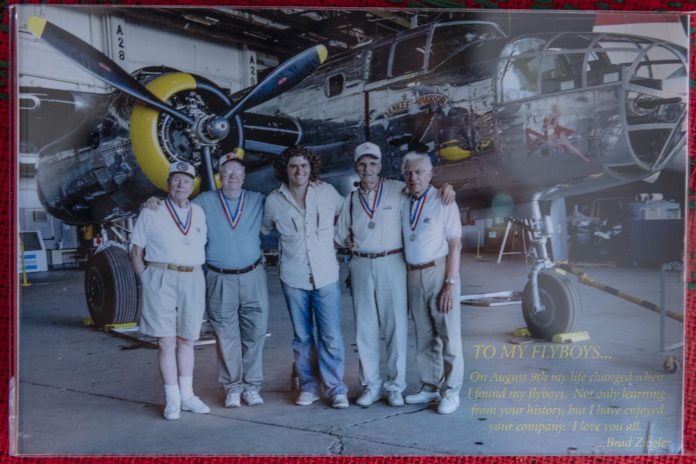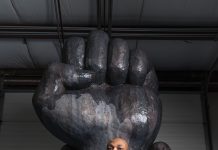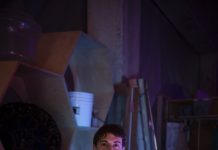
In 1999, my grandfather was dying of cancer. I was with him almost until the end, a time during which he told my dad to “get my book” — his ship book from the USS Tuscaloosa during World War II. We spent hours going through the pages. I had rarely seen him so engaged and determined. What stuck with me most from those final special days with him was why and when he’d joined the Navy: After Pearl Harbor was attacked, he wanted to do something and he wanted to contribute. He lived life with a mission.
Two years later, on Sept. 11, 2001, I was supposed to be taking photographs on the top of the World Trade Center in the afternoon. That was my Pearl Harbor. I never completely understood my grandfather until that day, but suddenly things became clearer. Unlike my grandfather, though, I had no clear mission. I had attended military college, but I never served. It was a very odd feeling, something I couldn’t shake after all my classmates were called up to serve and I didn’t go.
There was something I needed, and I wasn’t sure what — until I met the Flyboys, a local World War II veterans’ group.
My wife at the time heard Bill Rosnyai speaking on the radio and called me to tell me, “This is the guy to talk to.”
I’d been wanting to photograph World War II vets since watching Band of Brothers, and I learned that Bill and a group of other vets had formed a lunch group. They let me come to lunch, and I sort of never left.
In 2006, we went out to the Yankee Air Museum for a surreal experience. I photographed the Flyboys for Hour Detroit, and, incredibly, the museum let them fly in — and “take the stick” of — the exact bomber they’d once flown in the war.
They all said that day was better than the day they came home from the war. We continued to go to lunches and even share a Guinness after from time to time. I knew I was getting myself involved in something that would eventually cause great pain: I would eventually be attending many funerals for incredible friends. And I knew that one day, there would only be one Flyboy left.
Bill Rosnyai is possibly the sweetest man I have ever met. He was a navigator on a B-17 during World War II. After meeting him for lunch for years and learning of his story, I felt it necessary to share. I think Bill has cracked the secret of how to age gracefully.
The World War II vets I knew were active right up to the end. Burt, whose last mission was lead plane on June 6, 1944 (D-Day), had me get in a Pontiac G6. He looked over at me and said, “I’m fast but I’m safe.” He was in his 80s. I about died laughing. Bob Stachel, a pilot, would have us over to his house for a Heineken, and we talked Cole Porter and the passionate music of the ’40s. Murray Cotter, a bombardier, was hysterical.
“Here’s looking up your address,” he would say over a Guinness. “My wife hated that toast,” he’d say every time with a huge smile.
Fred Reichel had been a pilot and had been shot down and pursued through the mountains by civilians before being incarcerated in Germany. He served his time in Stalag Luft III, where The Great Escape took place. Fred Nunnold was a tail gunner who had been shot down in Germany and also held as a prisoner of war.
Other than his walker, Bill is the same man he was when I first photographed him in 2006. He’s a bit slower but still sharp as a tack. He loves to see my daughters growing up. He does pushups against the wall and has fought to maintain his independence. He’s 97 and still lives at home. Last year, he tragically lost his wife of over 50 years. Vivienne was a sweetheart, and he was dedicated to her until the end — just as any soldier would be. Bill never gave up on her. I think he has unlocked something so important, and that is “the mission.” Just like in 1944, he was given a mission to succeed. Now he has a new mission, and it’s to keep being engaged in life, to keep being relevant.
I believe these are the things that keep us going longer and with greater success. If we have a mission, a goal, or a purpose, then we have a reason to keep going. I want other young and middle-aged men to know how important it is to find a mission and to keep going. Bill is the model young men need to look up to. His stories are the playbook on how to live a long and healthy life.
That lesson, whether he realizes it or not, was the gift he and the other flyboys gave me. I never realized my work with World War II vets was helping me through my 9/11 experience, but it was by going back week after week to speak to these men that I slowly worked through my trauma.
It was through knowing them that my guilt for not serving slowly diminished. It was from getting to know them in their final years that I learned how to move forward, how to create purpose, how to have a mission, and ultimately, how to live.
Flip through more of Brad Ziegler’s photos of the Flyboys
This story is from the November 2022 issue of Hour Detroit magazine. Read more in our digital edition.
|
|
|


















